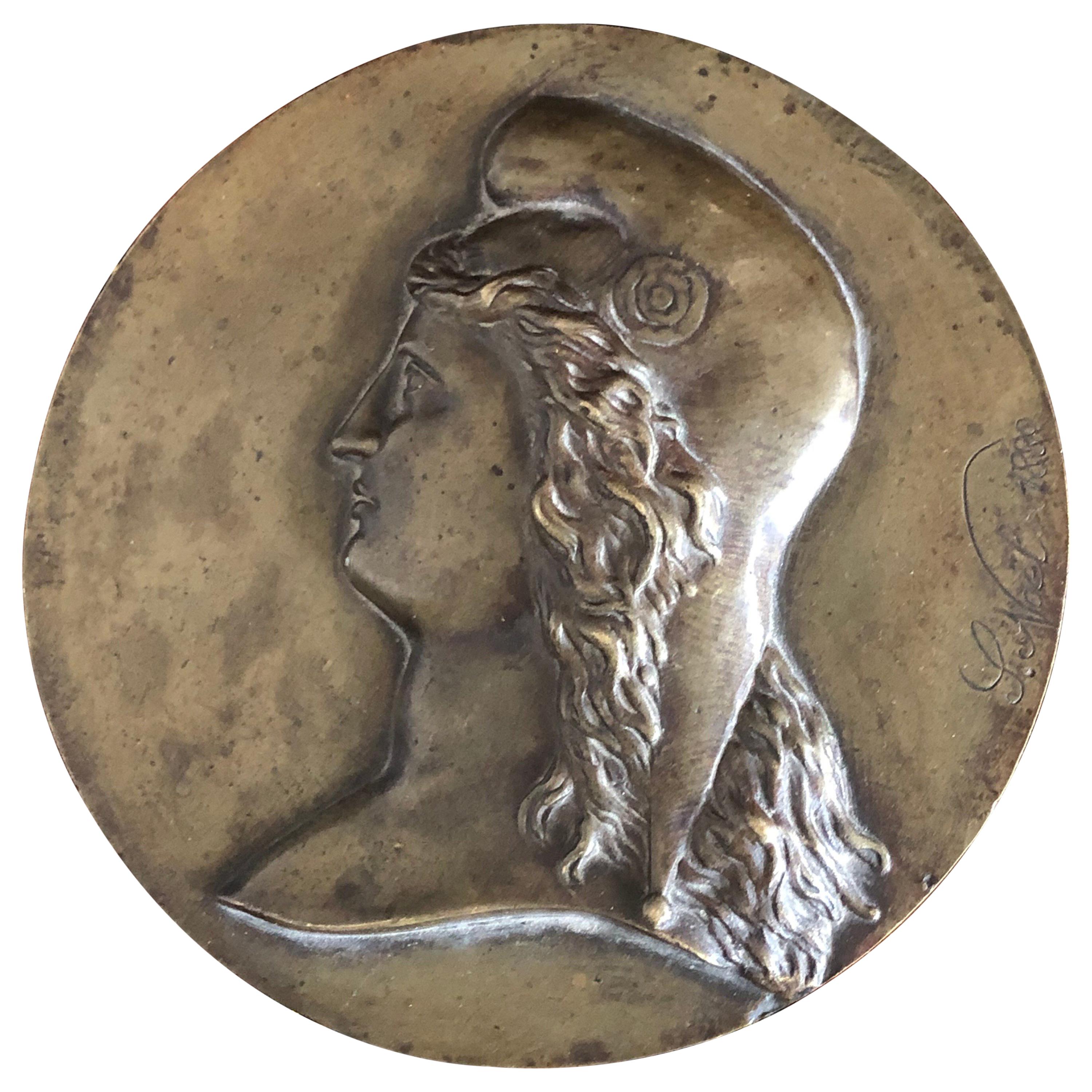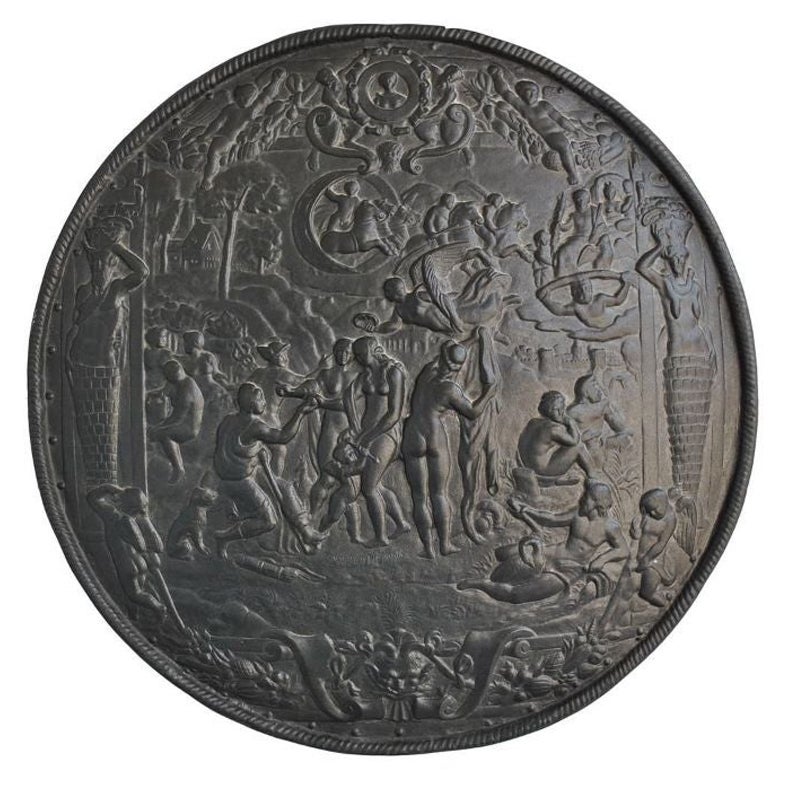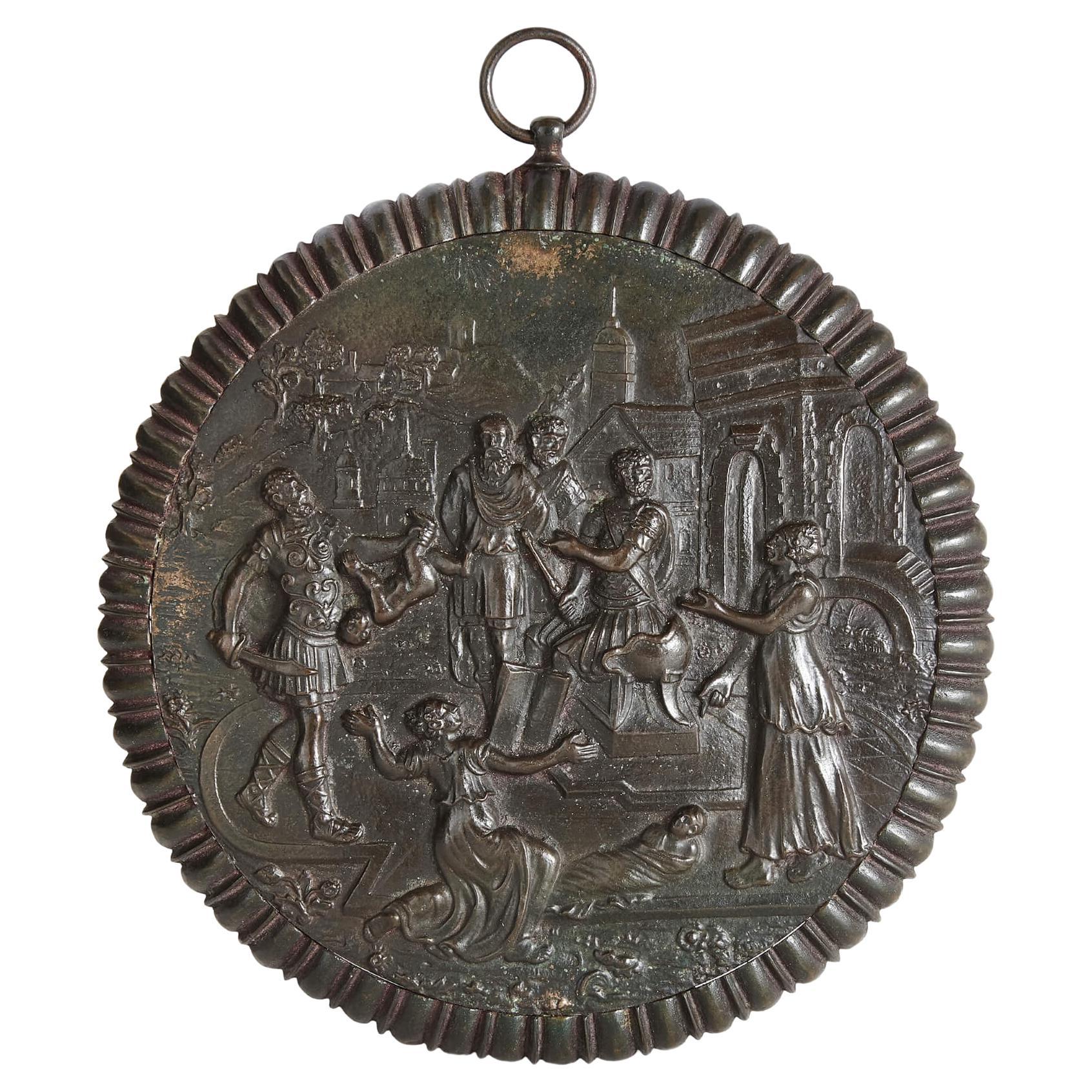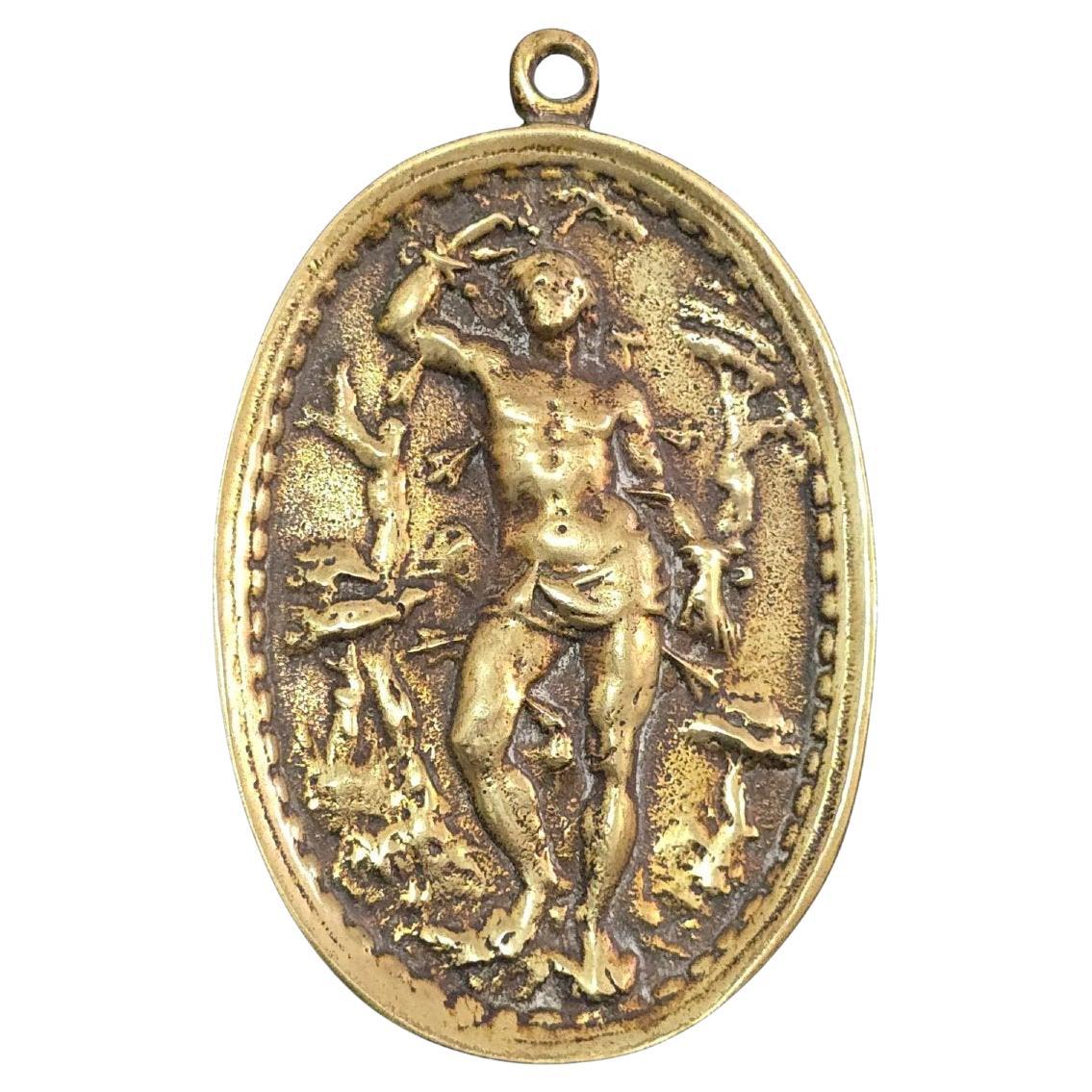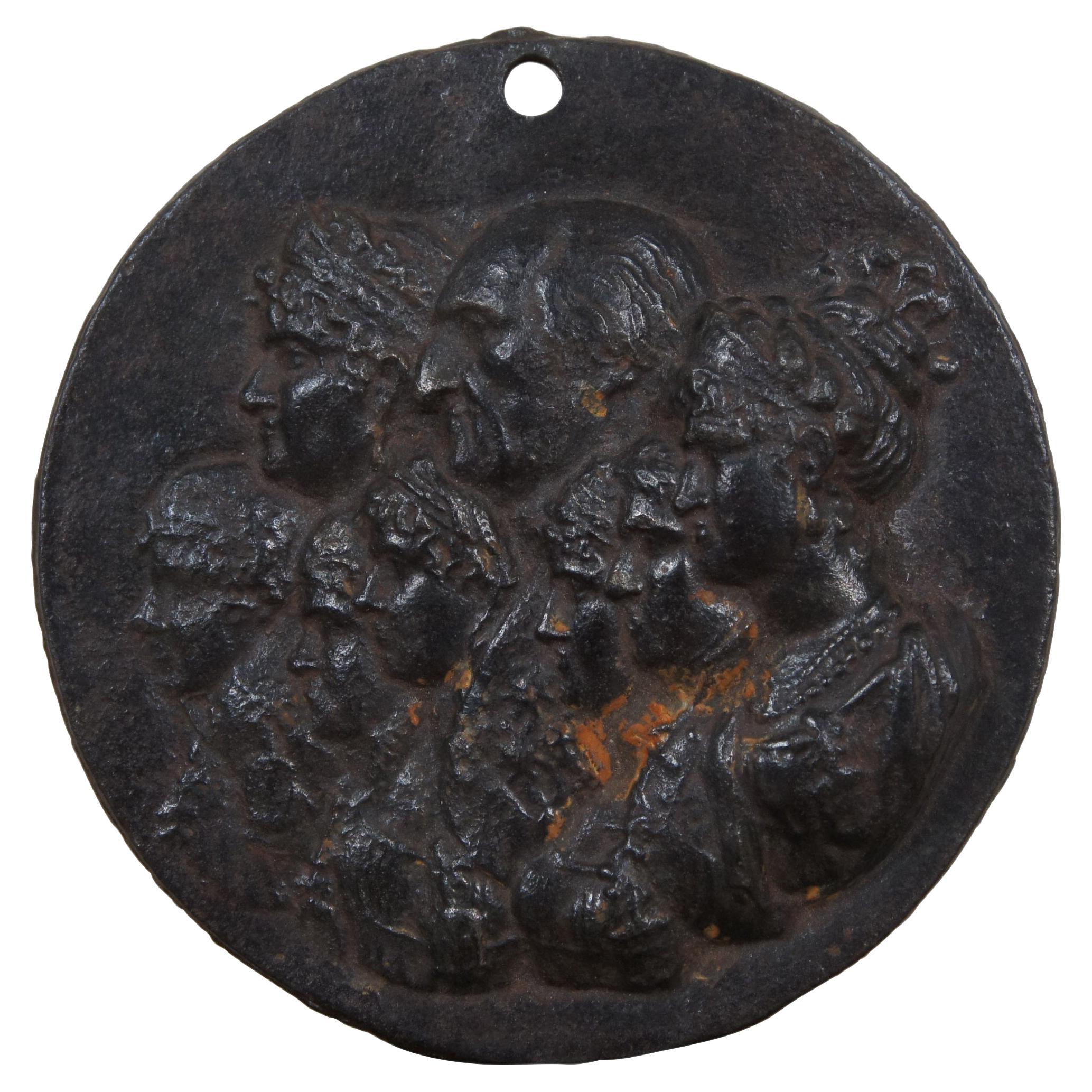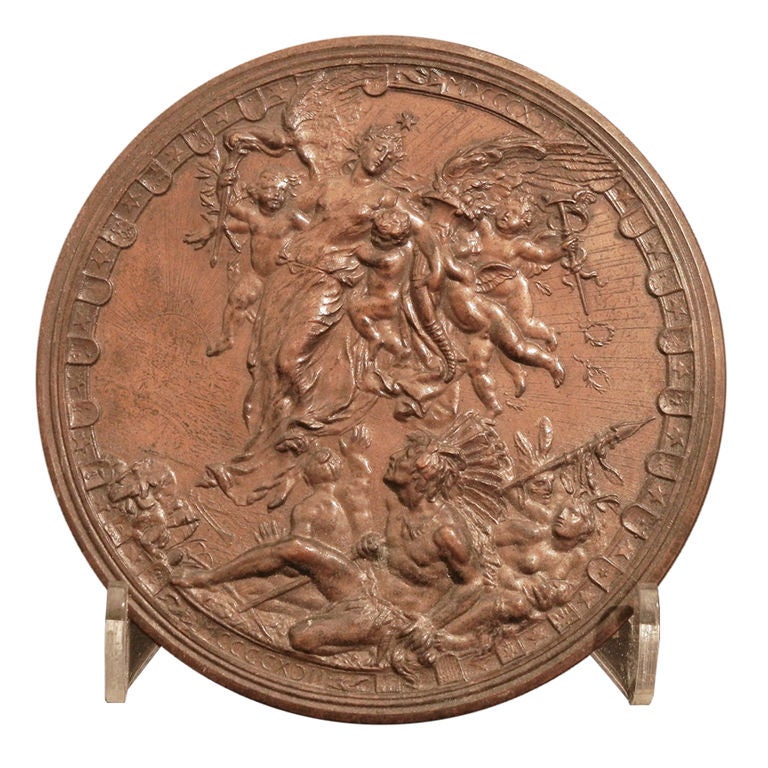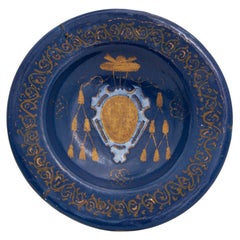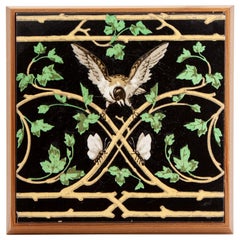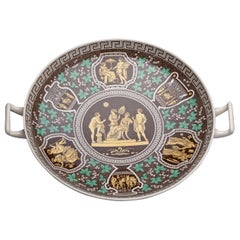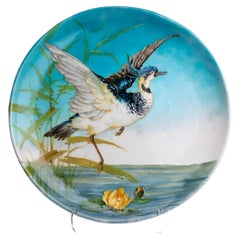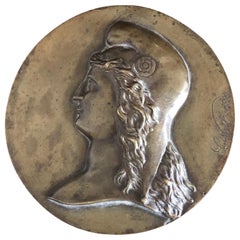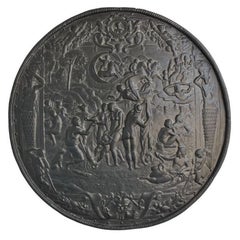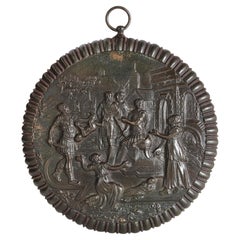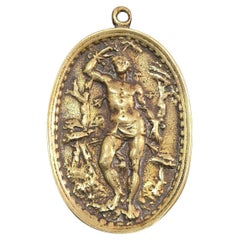Items Similar to 15th Century Italian Renaissance Bronze Medallion
Want more images or videos?
Request additional images or videos from the seller
1 of 10
15th Century Italian Renaissance Bronze Medallion
$4,000
£3,018.69
€3,455.94
CA$5,641.33
A$6,193.47
CHF 3,231.15
MX$74,949.64
NOK 40,497.42
SEK 38,159.22
DKK 25,797.70
About the Item
Renaissance bronze medallion made by Master IOFF in the mid 15th century, showing the mythological scene of Ariadne on Naxos.
Made in the mid-15th century by the Italian Master IO.F.F, this Renaissance-era bronze medallion depicts the mythological scene of Ariadne on Naxos. With a scene from Classical antiquity, medallions such as this one were often given as gifts and collected by individuals who wanted to associate themselves with an elite culture. Some nobles even went as far as dedicating entire rooms to their collection of medallions in order to convey wealth and power to guests.
The scene depicts the mythological story of Ariadne on the island of Naxos. Ariadne was the daughter of King Minos of Crete, whose famous labyrinth housed the Minotaur. When the hero Theseus faced the labyrinth, Ariadne equipped him with a sword and ball of thread so that he might slay the monster and find his way out. Theseus and Ariadne escaped Crete together, but soon Theseus abandoned her on the island of Naxos.
This myth was the subject of many Classical and Renaissance-era artworks, and most depictions portray Ariadne as Theseus left her: sleeping. Master IO.F.F’s medallion shows the resolution to the story. Dionysus discovered Ariadne on the island, fell in love with her, and married her.
A similar depiction of the myth can be seen in Titian’s Bacchus and Ariadne, painted around 50 years after this medallion was created.
Dimensions: 2 in. Dm (5 cm Dm)
Condition: Excellent, with the slightest rubbing to some of the high points.
References:
Metropolitan Museum of Art
Musée National de la Renaissance
National Gallery of Art
Victoria & Albert Museum
Literature:
Fulton, Christopher B. "The Master IO.F.F. and the Function of Plaquettes." Studies in the History of Art 22 (1989): 146, 158–159, note 7, fig. 2, as by Master IO.F.F.
Italian Renaissance Bronzes (New York: Paul Rosenberg & Co., 1980), p. 2.
Pope-Hennessy, John W. Renaissance Bronzes from the Samuel H. Kress Collection: Reliefs, Plaquettes, Statuettes, Utensils and Mortars. London, 1965: 33, no. 97, fig. 128, as Ariadne on Naxos, by “Master IO.F.F.”
Wilson, Carolyn C. Renaissance Small Bronze Sculpture and Associated Decorative Arts at the National Gallery of Art. Washington, 1983: 97, no. 16, as Ariadne on Naxos, by “Master IO.F.F.”
- Dimensions:Height: 0.13 in (3.31 mm)Diameter: 2 in (5.08 cm)
- Style:Renaissance (Of the Period)
- Materials and Techniques:Bronze,Cast
- Place of Origin:
- Period:
- Date of Manufacture:Mid-15th century
- Condition:Wear consistent with age and use. Excellent, with the slightest rubbing to some of the high points.4.
- Seller Location:Fort Lauderdale, FL
- Reference Number:Seller: 2021.6.11stDibs: LU5643237247212
About the Seller
5.0
Vetted Professional Seller
Every seller passes strict standards for authenticity and reliability
Established in 2020
1stDibs seller since 2021
40 sales on 1stDibs
Typical response time: 8 hours
- ShippingRetrieving quote...Shipping from: Fort Lauderdale, FL
- Return Policy
Authenticity Guarantee
In the unlikely event there’s an issue with an item’s authenticity, contact us within 1 year for a full refund. DetailsMoney-Back Guarantee
If your item is not as described, is damaged in transit, or does not arrive, contact us within 7 days for a full refund. Details24-Hour Cancellation
You have a 24-hour grace period in which to reconsider your purchase, with no questions asked.Vetted Professional Sellers
Our world-class sellers must adhere to strict standards for service and quality, maintaining the integrity of our listings.Price-Match Guarantee
If you find that a seller listed the same item for a lower price elsewhere, we’ll match it.Trusted Global Delivery
Our best-in-class carrier network provides specialized shipping options worldwide, including custom delivery.More From This Seller
View All16th Century Castelli Italian Maiolica Farnese alla turchina Dish
By Castelli
Located in Fort Lauderdale, FL
An extraordinary azure maiolica dish in the Farnese service, made by Castelli d'Abuzzo between 1580 and 1589.
In the peak of the High Renaissance, Cardinal Alessandro Farnese commissioned a dinner service from the Castelli maiolica...
Category
Antique 16th Century Italian Renaissance Decorative Art
Materials
Maiolica
Arts & Crafts Minton Pottery Tile Designed by Christopher Dresser
By Minton, Christopher Dresser
Located in Fort Lauderdale, FL
A Minton pottery tile designed by Christopher Dresser in 1873.
This tile, designed by Christopher Dresser and made in 1873, exemplifies the Aesthetic Movement ethos of the home as...
Category
Antique Late 19th Century British Aesthetic Movement Decorative Art
Materials
Earthenware
19th Century Copeland Spode Greek Tazza
By Copeland Spode
Located in Fort Lauderdale, FL
A brightly colored Neoclassical tazza or cake plate in the 'Greek' pattern made by Copeland Spode in the late 19th century.
This tazza, in Copeland Spode’s ‘Greek...
Category
Antique Late 19th Century British Neoclassical Revival Pottery
Materials
Earthenware, Pearlware
Early 20th Century French French Porcelain Plate by Paul Milet
Located in Fort Lauderdale, FL
A French porcelain hand-painted plaque by Paul Milet created in the early 20th century.
This plaque, created by Sèvres ceramicist Paul Milet in the early...
Category
Early 20th Century French Art Nouveau Ceramics
Materials
Ceramic, Porcelain
19th Century Neoclassical Polychrome Pitcher
By Samuel Alcock & Co.
Located in Fort Lauderdale, FL
A brightly colored English Neoclassical pitcher, made circa 1850 by Samuel Alcock & Co. The pitcher is glazed with lively colors--burgundy, cerulean, teal, peach--all accented with f...
Category
Antique Mid-19th Century English Neoclassical Revival Jars
Materials
Ceramic, Earthenware
Early Spode Red Greek Pattern Tile
By Josiah Spode, Spode
Located in Fort Lauderdale, FL
A Neoclassical red transferware tile made by Spode 1806-1810, with the ‘Refreshments for Phliasian Horseman’ pattern.
Sir William Hamilton’s Collection of Etruscan, Greek and Roman antiquities, first published in 1766 by Pierre d’Hancarville, was a landmark publication in English design. It intended to disseminate the Antique style through its engravings of Attic pottery. The catalog’s faithful reproductions of Classical vases led British potteries, including Spode, to adapt or even copy the ancient art for modern life. These Spode Greek pattern tiles reflect the major influence of Hamilton’s catalog on English Neoclassicism. The central scene was taken directly from the catalog.
This tile can be dated to a narrow window of production in the Spode factory, 1806-1810. During that time, Spode used a technique known as the “Pluck and Dust” method to print in red transfer designs onto creamware. Using this method, source prints were transferred overglaze using tissue imprinted with a very faint rendition of the design outlined in sticky oil. The decorator applied the tissue to the object then carefully “plucked” or pulled it away, leaving the sticky oil design behind. Then, a finely-ground enamel color was “dusted” onto the surface, sticking to any areas that had the oil. A final firing at a low temperature in the enamel kiln made the pattern permanent. The Pluck and Dust technique improved upon bat-printing and enabled larger designers to be transferred. It was short-lived, however, as under-glaze transfer printing soon took over as the preferred method for producing transferwares.
Dimensions: 5 in. x 5 in. x 1/4 in.
Condition: Excellent. Slight chip to the upper left corner measuring approximately 0.9 cm. in length.
Provenance:
The Collection of Nancy and Andrew Ramage
Jonathan Horne...
Category
Antique Early 19th Century English Neoclassical Pottery
Materials
Earthenware, Creamware
You May Also Like
19th Century Bronze Medallion Signed by L.Noël in 1880
Located in Sofia, BG
19th century bronze medallion signed by L.Noël in 1880.
Category
Antique Late 19th Century French Figurative Sculptures
Materials
Bronze
Decorative Cast Iron Medallion Representing the Judgment of Paris
Located in Marseille, FR
Decorative cast iron medallion representing "The Judgment of Paris" the rascal who, according to Homer, kidnapped the beautiful Helen from her husban...
Category
Antique Late 19th Century Abstract Sculptures
Materials
Iron
19th Century patinated bronze plaque of the Judgement of Solomon
Located in London, GB
19th Century patinated bronze plaque of the Judgement of Solomon
French, 19th Century
Diameter 16cm, depth 1.5cm
The circular front of this lustrous patinated bronze plaque is decor...
Category
Antique 19th Century French Sculptures and Carvings
Materials
Bronze
Gilt Bronze Plaque of Saint Sebastian — 17th Century
Located in Madrid, ES
Gilt Bronze Plaque of Saint Sebastian — 17th Century
Exceptional gilt bronze devotional plaque, made in Spain according to 17th-century principles. This type of object, of intimate ...
Category
Antique 17th Century Spanish Baroque Religious Items
Materials
Bronze
Antique 19th Century Cast Iron Royal Family Spain Portrait Medallion Plaque 7"
Located in Dayton, OH
Circa 19th century cast iron medallion / wall plaque depicting a portrait of King Charles IV of Spain and his family. The group portrait shows King Charles IV, Queen Maria Luisa of P...
Category
Antique 19th Century Spanish Colonial Decorative Art
Materials
Iron
$468 Sale Price
20% Off
"Momento of the 1893 World's Fair, " Bronze Relief w/ American Indian Motif
Located in Philadelphia, PA
Superbly sculpted and highly detailed, this very fine bronze relief dated 1892 -- designed by Lodovico Pogliaghi and sculpted by Angelo Cappuccio for Stefano Johnson in Milan -- depi...
Category
Antique 19th Century Italian Beaux Arts Sculptures
Materials
Bronze
$1,100 Sale Price
24% Off
More Ways To Browse
Medallions
Antique Medallion
15th Century Italian
Antique Gold Medallion
Italian Medallion
Antique Crete
Medallion Sculpture
Medallion Gold Italy
Italian Renaissance 15th Century
Ships Blown Glass
Stone Bonsai Tree
Tribal Necklace Mounted
African Bell
Demott Sailboat
Ox Cart Wheel
Thai Headdress
Tibet Flint
Tibetan Flint
